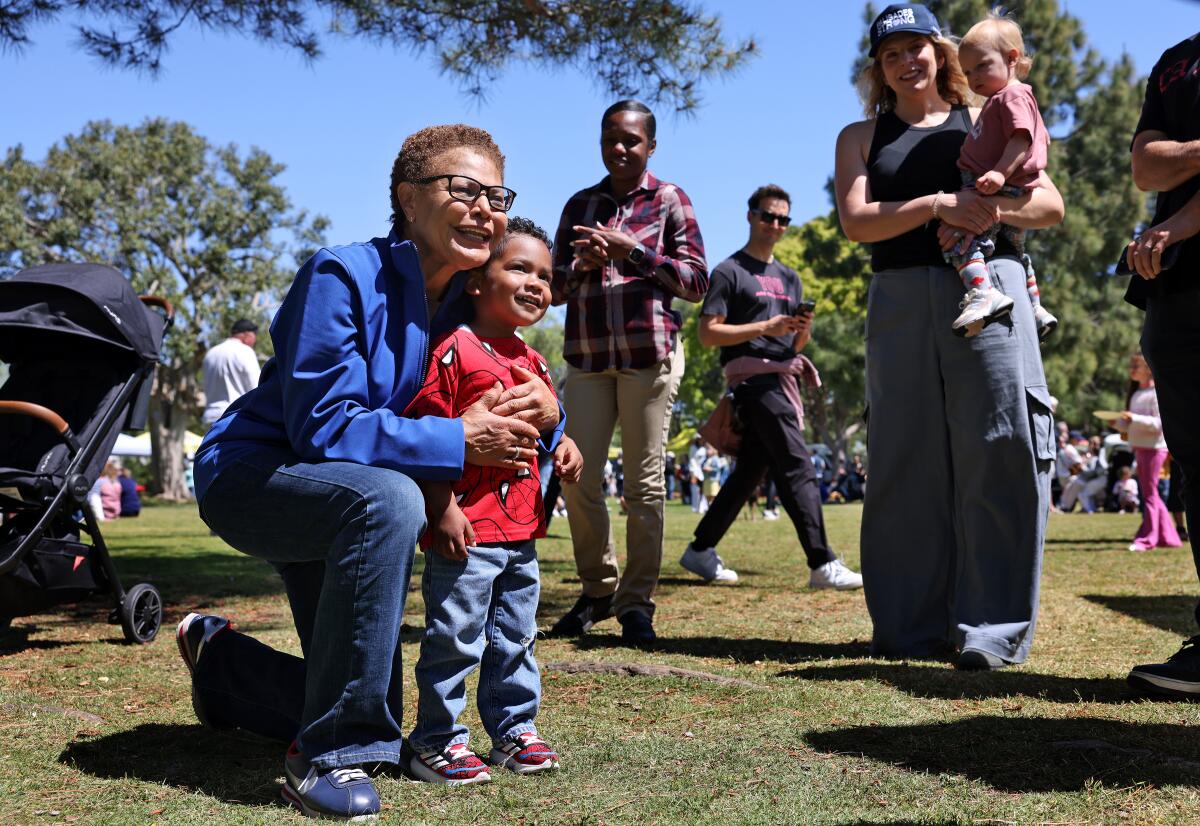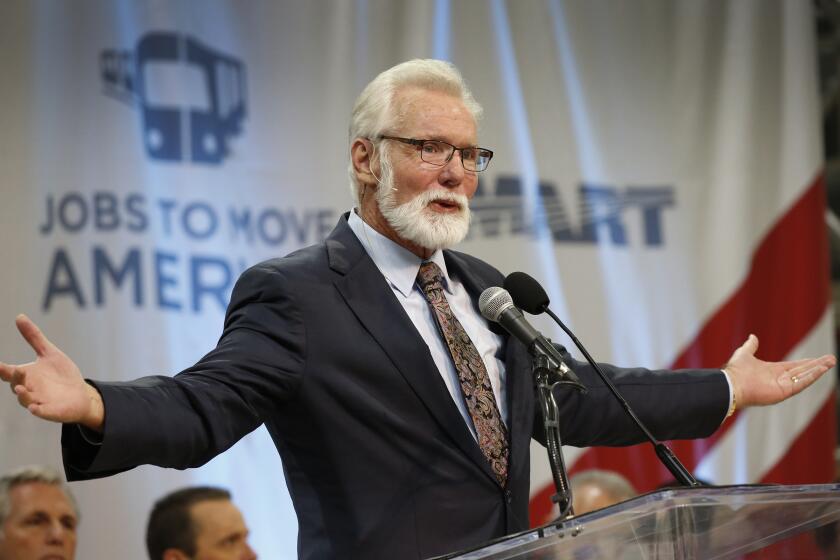Mayor Karen Bass weighs deep cuts, including layoffs, as L.A.’s challenges mount

- Share via
- On Monday, Bass will offer her assessment of the city’s overall health during her yearly State of the City address.
- She will also release her budget for 2025-26, laying out her plan for eliminating a nearly $1-billion shortfall.
- Bass has been weighing whether to lay off more than 1,500 city workers while also eliminating some vacant positions.
For Los Angeles Mayor Karen Bass, the list of problems keeps piling up.
She began the year facing a barrage of criticism over the city’s handling of the Palisades fire — her initial absence, her removal of an outspoken fire chief, the unpredictable doings of her recovery czar.
But even without that devastating emergency, there are other signs that the city has entered a precarious period.
Construction of new homes has steadily slowed, even as housing costs climb. Film and television productions have been fleeing the city, wounding an entertainment industry already in crisis. President Trump’s trade war and immigration crackdown threaten two other pillars of the economy: international trade and tourism.
On Monday, Bass will offer her assessment of the city’s overall health during her yearly State of the City address. That same day, she will release her budget for 2025-26, laying out her plan for addressing yet another huge problem: the city’s financial crisis.
Faced with a nearly $1-billion shortfall, Bass has been weighing whether to lay off more than 1,500 city workers — or almost 5% of the workforce — while also eliminating some vacant positions. Those behind-the-scenes deliberations have left many at City Hall anxious about the potential impact on street repairs, street lighting, animal shelters and public safety programs.
Faced with a nearly $1-billion budget shortfall, the Los Angeles City Council met behind closed doors to take a fresh look at its salary agreements with labor unions.
City Councilmember Ysabel Jurado, who took office in December representing part of the Eastside, said she has been taken aback by the magnitude of the challenges.

“I knew our city services were broken. I knew we were not having the healthiest budgeting. But I didn’t expect to have to consider thousands of possible layoffs,” she said.
Bass, for her part, is seeking to project optimism. In interviews with The Times, she highlighted last year’s reduction in street homelessness, a recent double-digit drop in homicides and shootings, and a fire recovery that she said is moving more quickly than following other massive wildfires.
“The city has challenges, no question. The city is not in decline. The city, in fact, is going to prepare to welcome the world in a little over a year,” Bass said, referring to the 2026 World Cup.
Bass said she is still hoping to avoid employee layoffs, in part by securing financial relief from Gov. Gavin Newsom and the state Legislature.
The mayor and several council members went to Sacramento last month to highlight the city’s dire financial condition. The mayor also spoke with Newsom by phone on Thursday about the crisis — and the city’s need for aid.
“I didn’t hear from him that there is no hope. I hung up with hope,” she said.

While Bass publicly touts the idea of state financial relief, her labor negotiators are working behind the scenes to persuade the city’s employee unions to make financial concessions, such as postponing pay raises scheduled for the upcoming fiscal year. Those increases, backed by Bass over the past two years, are expected to add about $250 million to next year’s budget, which takes effect July 1.
So far, the talks have not yielded results.
Last month, the board of the Los Angeles Police Protective League, which represents nearly 8,800 officers, took a stand against postponing the raises.
“You deserve every bit of compensation you receive,” the union’s board of directors said in a message to members, “and the city must look to other areas to tighten its belt.”
Service Employees International Union Local 721, which represents more than 10,000 civilian city workers, had a similarly combative message.

“We’re not going to allow the out-of-touch bureaucrats ... to balance the budget on the backs of city workers,” said David Green, president of SEIU Local 721.
The prospect of deep cuts to city services could further complicate Bass’ bid for reelection. Although she does not yet have any well-funded challengers, she remains a frequent target of criticism from real estate developer Rick Caruso, who ran against her unsuccessfully in 2022.
Caruso, who has not divulged whether he will run a second time, recently posted a video on social media highlighting the results of a new poll from the UCLA Luskin School of Public Affairs, which found that L.A. County residents were deeply frustrated with the region’s high cost of living.
The chattering among the city’s political class about potential competitors has grown louder. But it’s still unclear whether anyone will mount a serious challenge to an incumbent who still wields considerable clout.
That quality-of-life survey, which included residents outside L.A. who cannot participate in its city elections, showed that 49% of respondents had unfavorable views of Bass, up considerably from the prior year.

Mindy Romero, a political sociologist who runs USC’s Center for Inclusive Democracy, said the Palisades fire and the events that followed eroded some of the goodwill the mayor enjoyed during her first two years in office. Monday’s speech, she said, could allow Bass to reset the narrative.
“The State of the City, the State of the State, the State of the Union — all those types of reports out to the public are always about informing the public, but they’re also about setting a tone,” Romero said.
Darry Sragow, a Democratic Party strategist, said the dissatisfaction felt by L.A. voters goes beyond wildfire recovery.
The discontent stems not just from big issues, such as the loss of entertainment industry jobs, but also day-to-day matters such as broken sidewalks, pockmarked streets and lengthy 911 wait times.
“There’s a sense that things are not under control,” he said.
Sragow contends that the city’s financial problems are largely self-inflicted. And he voiced strong doubts about a windfall arriving from Sacramento.
“I don’t know that there would be a lot of sympathy for plowing a huge amount of state money into rescuing L.A.,” he said.
In the run-up to her State of the City speech, Bass has begun dropping hints about her upcoming budget. Appearing in Pacific Palisades this week to mark the 100th day since the outbreak of the fire, she said she will not cut the fire department budget.
Nor does she plan to make any cuts to Inside Safe, her signature initiative for fighting homelessness, she told The Times. “We still have to solve the city’s problems,” she said.
Some City Council members have begun expressing concern about the cost of Inside Safe, which relies heavily on leases with hotels and motels to temporarily house people moving off the streets.

By early March, Inside Safe had moved more than 4,000 homeless people indoors, according to a public dashboard. Of that total, about 1,350 eventually returned to the streets, while another 70 died.
Bass, as part of her effort to reduce homelessness, has cut red tape for certain types of affordable housing projects. But housing construction has still been on a downward trajectory.
Last year, the city’s Department of Building and Safety issued construction permits for 8,706 homes, a 43% drop compared to 2022, the year Bass took office, according to a report from the research firm Hilgard Analytics.
Mott Smith, who chairs the Council of Infill Builders, an advocacy group focused on development issues, said the city has failed to make meaningful progress in approving policies that will make it easier to build homes. As a result, he said, major investors and lenders are fleeing the Los Angeles market.
“Even the most die-hard boosters are questioning whether it makes sense to do business here,” said Smith, who served on a city working group focused on streamlining the permitting process.
Smith said the slowdown in housing development is depriving the city of property tax growth, which in turn reduces its ability to deliver services.
Advocates for the entertainment industry have argued a similar case, saying the loss of local film and television shoots is having a ripple effect on the economy — and weakening the city’s tax base.
With fewer local productions, L.A.’s entertainment workers are spending less at supermarkets, restaurants, dry cleaners and other businesses, said Monica Levinson, a member of Producers United, which met last week with the mayor’s team to seek additional support for the industry.
“People are not putting money into the economy,” Levinson said.
Last month, City Administrative Officer Matt Szabo informed the City Council that tax revenues were expected to come in $315 million below previous projections, due to a slowdown in local economic activity.
Bass said she will continue to push for expanded tax credits for the entertainment industry, while also searching for ways to cut filming costs locally. On housing, she said she wants a faster permitting system but also believes the problem is caused in large part by market forces, such as higher interest rates.

Meanwhile, the city is confronting yet another financial issue: the growing cost of payouts stemming from police misconduct, broken sidewalks and other types of lawsuits against the city.
The city will need to devote an additional $100 million to legal payouts — both settlements and jury awards — in the coming budget year, Szabo recently told the council.
Bass portrayed the downturn in economic activity and the soaring cost of legal payouts as the biggest drivers of the city’s budget woes. She expressed zero regret about her decision to boost the wages of police officers and other city employees, saying the move was needed to prevent workers from leaving.
Former City Councilmember Bernard C. Parks, who ran the council’s budget committee for eight years, attributed much of the city’s financial woes to the high cost of its public employee salary agreements.
Parks, a former LAPD chief who served on the council from 2003 to 2015, said he adopted a strategy for spending taxpayer funds early in his political career: “Never put anything in the budget that can’t be sustained.”
Now, Parks said, every layoff approved by the city will mean a reduction in some type of city service.
Times staff writer Noah Goldberg contributed to this report.
More to Read
Sign up for Essential California
The most important California stories and recommendations in your inbox every morning.
You may occasionally receive promotional content from the Los Angeles Times.














